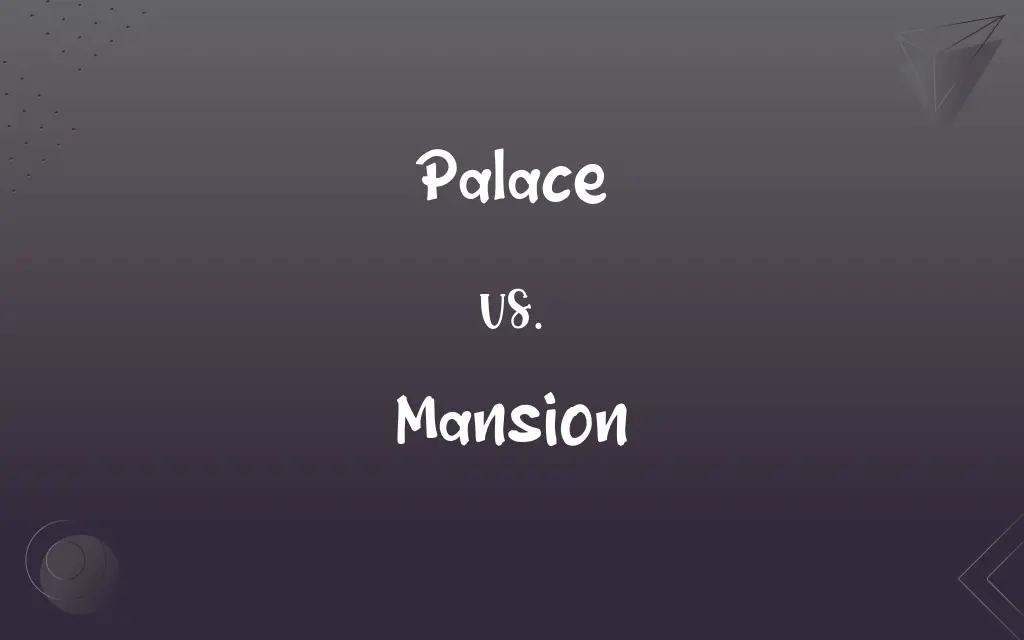Palace vs. Mansion: What's the Difference?
Edited by Aimie Carlson || By Janet White || Published on December 1, 2023
"A palace is a grand residence, often for royalty or heads of state, symbolizing authority; a mansion is a large, impressive private home, denoting wealth."

Key Differences
A palace is typically a grand, opulent building used as the residence of royalty, heads of state, or religious leaders. Mansions, in contrast, are large and luxurious private residences, often owned by wealthy individuals.
Palaces are often symbolic of political or national significance and can be centers of government or ceremonial events. Mansions, while also signifying wealth and status, are primarily private dwellings without official political or ceremonial functions.
The architecture of palaces often reflects historical and cultural significance, showcasing art and architecture from the period they were built. Mansions are more focused on luxury and personal style, reflecting the tastes of their owners.
Palaces are usually maintained and owned by the state or religious institutions and can be part of a nation's heritage. Mansions are privately owned and can be passed down through generations as part of family estates.
In terms of public access, palaces may be open for public tours, reflecting their cultural importance. Mansions, being private residences, are typically not open to the public unless converted into museums or hotels.
ADVERTISEMENT
Comparison Chart
Primary Function
Residence for royalty, heads of state
Luxurious private home
Symbolism
Political and cultural significance
Wealth and personal status
Architectural Style
Reflects historical and cultural significance
Focuses on luxury and personal taste
Ownership
State or religious institutions
Privately owned
Public Access
Often open for public tours
Typically private, not open to the public
ADVERTISEMENT
Palace and Mansion Definitions
Palace
The term 'palace' can also denote a grand, stately building used for public, official purposes.
The presidential palace hosted important diplomatic meetings.
Mansion
A mansion is a large, impressive residence, typically associated with wealth.
The millionaire built a sprawling mansion on the hillside.
Palace
A palace is an official residence of a king, queen, bishop, or other sovereign or exalted personage.
The Buckingham Palace is the London residence of the British monarch.
Mansion
'Mansion' often refers to a historic or architecturally significant residence.
The Victorian mansion was a local landmark.
Palace
'Palace' can refer to a large and splendid ornate building.
The palace was adorned with beautiful gardens and fountains.
Mansion
In literary contexts, a mansion can symbolize opulence and grandeur.
The story described a mysterious mansion filled with untold secrets.
Palace
In historical contexts, a palace is often the seat of government or administrative power.
The Forbidden City was the Chinese imperial palace for almost 500 years.
Mansion
In real estate, a mansion signifies a sizable, high-end home.
They put their luxury mansion up for sale.
Palace
In some regions, 'palace' describes a large, luxurious hotel.
They stayed at a magnificent palace hotel during their vacation.
Mansion
The word 'mansion' can also mean a large building divided into apartments.
The old mansion was converted into several upscale apartments.
Palace
The official residence of a royal personage or other high dignitary.
Mansion
A large stately house.
Palace
A large or splendid residence.
Mansion
A manor house.
FAQs
Can a palace be a tourist attraction?
Yes, many palaces are popular tourist attractions due to their historical significance.
Are mansions open to the public?
Mansions are usually private residences and not open to the public.
What's the difference in architecture between palaces and mansions?
Palaces often have grand, historical architecture, while mansions focus on luxury and personal style.
What denotes a building as a mansion?
The size, luxury, and architectural significance typically denote a building as a mansion.
Do palaces have symbolic meanings?
Yes, palaces often symbolize political and cultural power.
Who typically lives in a palace?
Royalty, heads of state, or religious leaders typically reside in palaces.
Can a mansion be a heritage property?
Yes, many mansions are considered heritage properties due to their historical and architectural value.
Are there modern palaces?
Yes, there are modern palaces, although they may blend traditional and contemporary elements.
Are mansions always expensive?
Mansions are typically expensive due to their size, location, and luxury.
Do palaces have historical tours?
Many palaces offer historical tours to the public.
Are palaces only found in monarchies?
No, palaces can be found in various types of governments and religious settings.
Are palaces owned by governments?
Many palaces are owned and maintained by governments or religious institutions.
What is a common feature in mansions?
Common features in mansions include large rooms, luxurious amenities, and expansive grounds.
What is a common use for old mansions?
Old mansions are often used as museums, hotels, or event venues.
How is a mansion different from a regular house?
A mansion is larger and more luxurious than a regular house.
Can a palace be a hotel?
Some palaces have been converted into luxury hotels.
How do mansions impact local real estate?
Mansions can raise the value and prestige of surrounding real estate.
Can a mansion have historical significance?
Yes, many mansions have historical significance and can be preserved as landmarks.
Do all palaces have royal residents?
Not all palaces have royal residents; some serve as museums or official buildings.
Can anyone visit a palace?
Access to palaces depends on their current use and public access policies.
About Author
Written by
Janet WhiteJanet White has been an esteemed writer and blogger for Difference Wiki. Holding a Master's degree in Science and Medical Journalism from the prestigious Boston University, she has consistently demonstrated her expertise and passion for her field. When she's not immersed in her work, Janet relishes her time exercising, delving into a good book, and cherishing moments with friends and family.
Edited by
Aimie CarlsonAimie Carlson, holding a master's degree in English literature, is a fervent English language enthusiast. She lends her writing talents to Difference Wiki, a prominent website that specializes in comparisons, offering readers insightful analyses that both captivate and inform.






































































